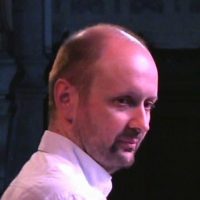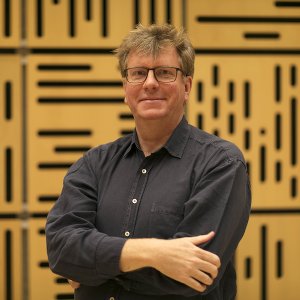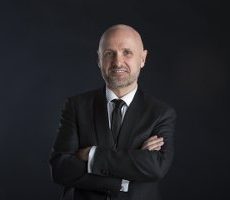IFAC organizes the 1st International symposium of choir conducting teachers and the second edition of The choir in all its states in partnership with the Conservatoire du 5 Gabriel Fauré and in conjunction with the 9th International competition for young conductors .
Registration to the Symposium gives access to the different rounds of the 9th International competition for young conductors including the final.
This symposium is open to all choir conducting teachers and classes from Europe and beyond.
Registration deadline : 11/10/2019
Working language : English
►Schedule and themes
Download the program
Sunday 20 October 2019
International collaboration : how to improve the exchanges between choir conducting teaching classes in Europe
Leader: Georg Grün (Germany)
Choir conducting teachers regret very often the difficulties for their students to move in another country during the course of the year, on short periods, due to lack of process (except « Erasmus »).
Georg Grün wants to experiment a distance masterclass to allow his students to attend courses from another country or to foreign students to follow his courses. French students and spanish students shall be invited to participate through remote participation to german courses.
Georg Grün will present a first report of this experiment and will open the debate on the possible developments. Participants shall then propose some methods for cooperations on a european and international level between choir conducting classes.
Evaluation
Leader: Philippe Le Fèvre (France)
IFAC is working on students evaluation for many years. How do we evaluate the skills and abilities of a student? In connection with the competition, the participants of the symposium will work on this topic during and after the competition, sharing their evaluation of the semi-final and final competitors.
Monday 21 October 2019
The singing skills of the conductor : how the singing skills of the conductor is important to improve the sound of the choir
Leader: Edward Caswell (UK)
Knowledge is Power: the choral conductor’s understanding of singing.
A basic knowledge of how to sing, how to get the best out of the human voice, will make a huge difference to what a choral director is able to achieve with his or her choir. It sounds obvious, but there will be choral conductors who have never had a singing lesson. The basics of singing can be easily taught, and once learnt, this handful of ideas can be easily passed on and incorporated into choir training. Quite simply, members of the choir are singing; and being able to sing better will make it a better choir: better at high notes, better at long phrases, better at intonation, better at singing fortissimo and pianissimo and getting from one to the other; better at giving the audience something special, memorable and moving.
The differences and the common aspects of orchestra and choir conducting
Leader: Josep Vila i Casañas (Spain)
Choral and orchestra conducting are two disciplines which have lots in common despite the fact that, from a certain point, they require to be trained in different ways. The first one deals with a unique instrument, the human voice, while the second one deals with many. A literary text is always determinant in choral literature interpretation while instrumental music expresses by itself. Nevertheless, beyond these and many other differences, they try to unify musical expressions while leading an ensemble and use our body as an instrument to express the musical ideas. That’s why, in the end, both conducting specializations should be considered as a unique discipline. We propose going deeper in comparing choral and orchestra conducting art, in order to enrich our labour as educators.
Location
- Conservatoire du 5e Gabriel Fauré
12 rue de Pontoise 75005 PARIS
►Leaders
Georg Grün (Germany)
 Georg Grün is considered to be one of the most sought-after international choral conductors and specialists for choral sound. He founded the KammerChor Saarbrücken in 1990 and has been its artistic director ever since then. He has won the most important international and national choir competitions, he gives concerts at numerous renowned music festivals and he regularly produces CDs with Saarländischer Rundfunk, Carus and Rondeau Productions.
Georg Grün is considered to be one of the most sought-after international choral conductors and specialists for choral sound. He founded the KammerChor Saarbrücken in 1990 and has been its artistic director ever since then. He has won the most important international and national choir competitions, he gives concerts at numerous renowned music festivals and he regularly produces CDs with Saarländischer Rundfunk, Carus and Rondeau Productions.
From 2000 until 2013 he held a professorship for choral conducting at the University of Music and Performing Arts Mannheim. There, he founded a chamber choir with which he also won several international prizes. In 2012, Georg Grün changed to the University of Music Saar as a professor and became artistic director of the BachChor Saarbrücken. Since 2008 he has been a baritone member of Daarler Vocal Consort.
Georg Grün works as guest conductor and guest professor, juror and tutor at international masterclasses for choral conducting around the world. Since 2010 he has been a mentor at the forum for conductors of the German Music Council and since 2015, he has been Chairman at the jury of the International Chamber Choir Competition Marktoberdorf since 2015. He is increasingly concerned with improvisation (piano / organ) and performance and is also active as a composer and arranger.
Philippe Le Fèvre (France)
 As a musical director and as a choral director, Philippe Le Fèvre is eager to make classical music accessible to as large an audience as possible.
As a musical director and as a choral director, Philippe Le Fèvre is eager to make classical music accessible to as large an audience as possible.
With Le Capriccio Français he has performed hundreds of times, in prestigious and famous festivals as well as in more humble places. He has performed with the most renowned soloists and with amateur choirs alike.
When Le Capriccio Français was founded, he intended to perform the 18th century amazing repertoire. They play period instruments because they mean to link every musical era with its proper instruments and interpretation. But they have since approached classical and romantic repertoires, and their performance of the Traviata on period instruments was a world premiere!
Le Capriccio Français could lately be heard in great performances (J.S. Bach Mass in B minor, St. Matthew Passion and St John Passion, W.A. Mozart Great Mass in C minor) and more intimate concerts, as well as our four productions: Mozart, an intimate opera – Haendel, caro Sassone – Vivaldi, the Venetian – Si Versailles m’était chanté.
Alongside his work as a musical director, Philippe Le Fèvre favors pedagogy and transmission: he has therefore founded a Summer Music Academy for future young artists, he is a Professor at Cergy-Pontoise Regional Conservatory and Paris 9e Conservatory. He is also the Choral conductor of two amateur choirs including the french Parliament choir, and he regularly delivers lectures.
The same passion has led him to join IFAC in 2010, as an Artistic and Pedagogical Director for several years, and now as a member of its Board. He aims at creating new repertoires, developing choral directing programs, and establishing international connections.
Edward Caswell (United Kingdom)
Edwa rd Caswell is a versatile and widely respected choral conductor, singer and teacher. Working throughout the UK and Europe he has established a reputation for approaching choral conducting from a singer’s perspective. Since 2004 he has worked with professional choirs, amateur choirs and student choirs throughout Europe, particularly in the U.K., Germany, The Netherlands and Belgium, and the current season begins with a concert featuring music by Britten, Pärt and Bernstein’s Chichester Psalms with Octopus Chamber Choir at the Palais des Beaux-Arts, Brussels.
rd Caswell is a versatile and widely respected choral conductor, singer and teacher. Working throughout the UK and Europe he has established a reputation for approaching choral conducting from a singer’s perspective. Since 2004 he has worked with professional choirs, amateur choirs and student choirs throughout Europe, particularly in the U.K., Germany, The Netherlands and Belgium, and the current season begins with a concert featuring music by Britten, Pärt and Bernstein’s Chichester Psalms with Octopus Chamber Choir at the Palais des Beaux-Arts, Brussels.
In 2013 Edward founded Cromarty Youth Opera in the Scottish Highlands with a production of Noye’s Fludde by Benjamin Britten, and in August this year led the company in the world premiere of their fifth anniversary commission Tod!, an opera based on the writings of Beatrix Potter by Andrew Gant.
He published his first book : It’s always a Pussycat : a singer’s approach to choral conducting.
Josep Vila i Casañas (Spain)
 Conductor, composer and pedagogue, Josep Vila i Casañas conducts the Lieder Càmera Chamber Choir from Sabadell and collaborates often as guest conductor with the Francesc Valls Chamber Choir from Barcelona.
Conductor, composer and pedagogue, Josep Vila i Casañas conducts the Lieder Càmera Chamber Choir from Sabadell and collaborates often as guest conductor with the Francesc Valls Chamber Choir from Barcelona.
He has served as the resident conductor of the Orfeó Català choral society (1998-2016), the Cor de Cambra of the Palau de la Música Catalana (2011-2016) and the Radiotelevisión Española Choir (2007- 2010). He has worked as a guest conductor with the Spanish National Choir, the World Youth Choir (2010 and 2019) and the Swedish Radio Choir among others. He has written an extensive body of works for children’s and youth choirs, for mixed a cappella choirs and for choir and orchestra. Since 2005, he has taught choir conducting at the Catalonia Music Highschool.
►Registration
Please follow the instruction to register directly online :
- Fill in the registration form.
- Pay the participation fee.
- Individual participants are required to be member of IFAC (except if in professional training). If you are not yet, please follow the instruction to pay your membership (20€).
Your participation will be only confirmed when you will have received the payment of the participation fee and the membership.
►Fees
|
IFAC member |
IFAC no member |
||||
|
Fees |
Individual |
1 day (precise) |
□ 50€ |
□ 50€ |
+ 20€ (membership) |
|
2 days |
□ 100€ |
□ 100€ |
|||
|
Student |
□ 0€ |
□ 20 € (membership) |
|||
|
Professional training |
□ 200€ |
||||
You can also make a donation for IFAC
►Version française
L’IFAC organise le Symposium international des formateurs en direction de chœur et la deuxième édition du Chœur dans tous ses états en partenariat avec le Conservatoire du 5e Gabiel Fauré et en parallèle du 9e concours international de jeunes chefs de chœur .
L’inscription au Symposium comprend l’accès aux différentes épreuves du 9e Concours international de jeunes chefs de chœur dont la finale.
Date limite d’inscription : 11/10/2019
Langue de travail du Symposium : Anglais
Programme
Télécharger le programme
Dimanche 20 octobre
Collaboration internationale : comment améliorer les échanges entre les enseignements de direction de choeur en Europe
Intervenant : Georg Grün (Allemagne)
Les formateurs en direction de chœur regrettent souvent la difficulté pour leurs étudiants de changer de pays en cours d’année afin d’étudier sur des courtes périodes dans un autre pays à cause du manque de dispositifs (hors « Erasmus »).
Georg Grün souhaite tester une solution de masterclass à distance pour permettre à ses étudiants d’assister à un cours dans un autre pays ou à des étudiants étrangers d’assister à ses cours. Des étudiants de classes françaises et espagnoles pourront être invités à participer à distance.
Georg Grün présentera un premier bilan de cette expérience et ouvrira sur les développements possibles. Les participants pourront ensuite proposer des modes de collaborations à envisager au niveau européen et international.
Évaluation
Intervenant : Philippe Le Fèvre (France)
L’IFAC travaille sur l’évaluation des étudiants depuis de nombreuses années. Comment évaluons-nous les compétences et les aptitudes d’un étudiant ? En corrélation avec le concours, les participants du symposium travailleront sur ce sujet pendant et après le concours, partageant leur évaluation sur les candidats de la semi-finale et de la finale du concours.
Lundi 21 octobre
Comment les compétences vocales du chef de chœur peuvent l’aider à améliorer le son du chœur
Intervenant : Edward Caswell (Royaume-Uni)
Des connaissances de base sur la manière de chanter et d’obtenir le meilleur de la voix humaine contribueront énormément à ce qu’un chef de chœur est capable de réaliser avec son choeur. Les bases du chant peuvent être facilement enseignées, et une fois apprises, ces quelques idées peuvent facilement être transmises et intégrées dans le travail du choeur. Tout simplement, les membres du choeur chantent, et le fait qu’ils chantent mieux en fera un meilleur choeur : mieux chanter les notes aiguës, mieux tenir les longues phrases, avoir une meilleure intonation, mieux chanter les fortissimo et pianissimo, et pouvoir aller de l’un à l’autre, chanter mieux pour donner au public quelque chose de spécial, mémorable et émouvant.
Les différences et les points communs de la direction d’orchestre et de la direction de chœur
Intervenant : Josep Vila i Casañas (Espagne)
La direction de chœur utilise un instrument unique, la voix humaine, alors que la direction d’orchestre utilise plusieurs instruments. Un texte littéraire est toujours déterminant dans l’interprétation de la littérature chorale alors que la musique instrumentale s’exprime par elle-même. Néanmoins, malgré ces différences, chefs de chœur et chefs d’orchestre doivent veiller à unifier les expressions musicales en utilisant leurs corps comme un instrument pour exprimer les idées de la musique. C’est pourquoi, finalement, les deux spécialités de la direction devraient être considérées comme une discipline unique selon Josep Vila i Casañas.
Inscriptions
Suivez les étapes de votre inscription en ligne :
- Complétez le formulaire d’inscription.
- Réglez les frais de participation.
- Tous les participants individuels doivent être membres de l’IFAC (sauf s’ils sont pris en charge dans le cadre de la formation professionnelle continue). Si vous ne l’avez pas déjà fait, merci de suivre les instructions pour régler votre cotisation (20€).
Votre inscription ne sera confirmée qu’à réception du règlement des frais de participation et de votre adhésion.
Tarifs
|
Adhérent |
Non adhérent |
||||
|
Frais pédagogiques |
Individuel |
1 jour (précisez) |
□ 50€ |
□ 50€ |
+ 20€ (adhésion) |
|
2 jours |
□ 100€ |
□ 100€ |
|||
|
Étudiant |
□ 0€ |
□ 20 € (adhésion) |
|||
|
Formation professionnelle continue |
□ 200€ |
||||
Vous pouvez également faire un don à l’IFAC
